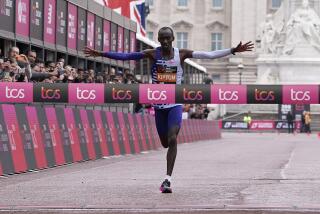Oh Mile! Record Is Now 3:43.13
- Share via
It has been personal, a fixation for Hicham El Guerrouj.
And once it was embarrassing.
His eyes have been on a target since he became a world-class distance runner in the mid-1990s. Noureddine Morceli of Algeria should have been running with concentric rings on his singlet.
El Guerrouj, a 24-year-old Moroccan, hit the bull’s-eye Wednesday night in the Golden Gala meet at Rome when he ran a 3-minute 43.13-second mile that broke Morceli’s world record.
Broke it? The mark was shattered by 1.26 seconds.
And make that hit the bull’s-eye again. El Guerrouj has sent Morceli to the distance-running archives, having broken his 1,500-meter and mile world records, both at Rome’s Olympic Stadium, a year apart.
“Rome is a magic track for me,” El Guerrouj said. “I can’t compare this year with last year. It’s another El Guerrouj. I was more concentrated, but the public was the same.”
That means supportive and enthusiastic, and used to brash El Guerrouj’s performances by now, as is the rest of the world.
After his run, he suggested he could lower the 1,500 record to 3:24 and run the mile in 3:41 or 3:42.
“Before, there was Said Aouita, then Morceli, now it’s the hour of Hicham,” El Guerrouj said recently. “Now I believe only the clock can beat me.”
In this case, even the clock couldn’t. On Wednesday night, he was helped by shouting, applauding fans and by Kenya’s Noah Ngeny, who challenged El Guerrouj down the stretch and finished in 3:43.40, also well ahead of Morceli’s record.
El Guerrouj ran a victory lap, waving a Moroccan flag. He dedicated the race to his family and to King Hassan II of Morocco.
“I needed to bring some happiness to my family, as my uncle died recently,” he said. “I hope God continues to give me strength because I want to be the strongest in the world at all distances between 1,500 and 5,000.”
He might already be there.
El Guerrouj served notice that he should be watched when he ran 3:33.61 for 1,500 meters in Nice, France, as a teenager in 1994.
In 1996, he won 12 of 13 races at a mile or 1,500 meters and ended Morceli’s four-year winning streak at 1,500 meters, winning the IAAF Grand Prix final.
El Guerrouj won 14 of 15 races in 1997, losing only at one mile in the Grand Prix final. Last year, he won all 12 races, including one at 2,000 meters, and just missed world records in the mile with 3:44.60 and 2,000 meters with 4:48.36. He is undefeated this year.
He is the first Moroccan to hold the mile record, one of track and field’s most hallowed marks, one that has been broken only three times in the last 18 years.
Britain’s Sebastian Coe reduced the record to 3:47.33 in 1981, and the mark stood until 1985, when another Briton, Steve Cram, lowered it to 3:46.32. Cram’s time held for eight years until Morceli clipped nearly two seconds off it, running 3:44.39 in Rieti, Italy, in 1993.
And then El Guerrouj clipped Morceli.
Literally.
It was El Guerrouj’s lone loss in 1996, and it has had a lasting impact on his career.
At the Atlanta Olympics, while approaching the bell lap of the 1,500-meter race, El Guerrouj ran up on Morceli and, while pulling out to pass, clipped his heels and fell.
He was crushed after getting up and finishing last in a race Morceli won, but 10 minutes afterward, El Guerrouj received a condolence call from King Hassan II, who told him, essentially: You are young. It’s not the end of the world. I consider you a winner and so do all your countrymen.
“It was as if another El Guerrouj was born that moment,” the runner said later.
El Guerrouj beat Morceli by more than two seconds at 1,500 meters at a meet in Paris a year later, and he is far from finished.
“My only enemy is Hicham,” he has said. “I am only at the beginning of my career. There is more I can do.”
Cram agreed.
“What I saw in Rome was awesome,” he said a year ago, after El Guerrouj had broken the world record at 1,500 meters, running 3:26.
“This guy can take the world record into another dimension. We used to think that the differential between the 1,500 meters and mile was something like 17 seconds. Now it is closer to 15, which means that El Guerrouj should be capable of running 3:41 for the mile. I’m only glad that I’m not running now.”
Were he still running, he would be merely another target for a young Moroccan who is getting used to hitting the bull’s-eye.
(BEGIN TEXT OF INFOBOX / INFOGRAPHIC)
Milestones
World mile progressions since Roger Bannister broke the four-minute barrier in 1954:
* May 6, 1954: Roger Bannister, Britain, 3 minutes 59.4 seconds, at Oxford, England.
* June 21, 1954: John Landy, New Zealand, 3:58.0, Turku, Finland.
* July 19, 1957: Derek Ibbotson, Britain, 3:57.2, London.
* Aug. 6, 1958: Herb Elliott, Australia, 3:54.5, Dublin, Ireland.
* Jan. 27, 1962: Peter Snell, New Zealand, 3:54.4, Wanqanui, New Zealand.
* Nov. 17, 1964: Peter Snell, New Zealand, 3:54.1, Auckland, New Zealand.
* June 9, 1965: Michel Jazy, France, 3:53.6, Rennes, France.
* July 17, 1966: Jim Ryun, United States, 3:51.3, Berkeley.
* June 23, 1967: Jim Ryun, United States, 3:51.1, Bakersfield.
* May 17, 1975: Filbert Bayi, Tanzania, 3:51.0, Kingston, Jamaica.
* Aug. 12, 1975: John Walker, New Zealand, 3:49.4, Goteborg, Sweden.
* July 17, 1979: Sebastian Coe, Britain, 3:49.0, Oslo.
* July 19, 1980: Steve Ovett, Britain, 3:48.8, Oslo.
* Aug. 19, 1981: Sebastian Coe, Britain, 3:48.53, Zurich, Switzerland.
* Aug. 26, 1981: Steve Ovett, Britain, 3:48.40, Koblenz, Germany.
* Aug. 28, 1981: Sebastian Coe, Britain, 3:47.33, Brussels.
* July 27, 1985: Steve Cram, Britain, 3:46.32, Oslo.
* Sept. 5, 1993: Noureddine Morceli, Algeria, 3:44.39, Rieti, Italy.
* July 7, 1999: Hicham El Guerrouj, Morocco, 3:43.13, Rome.
*
The Associated Press contributed to this story.
More to Read
Go beyond the scoreboard
Get the latest on L.A.'s teams in the daily Sports Report newsletter.
You may occasionally receive promotional content from the Los Angeles Times.










